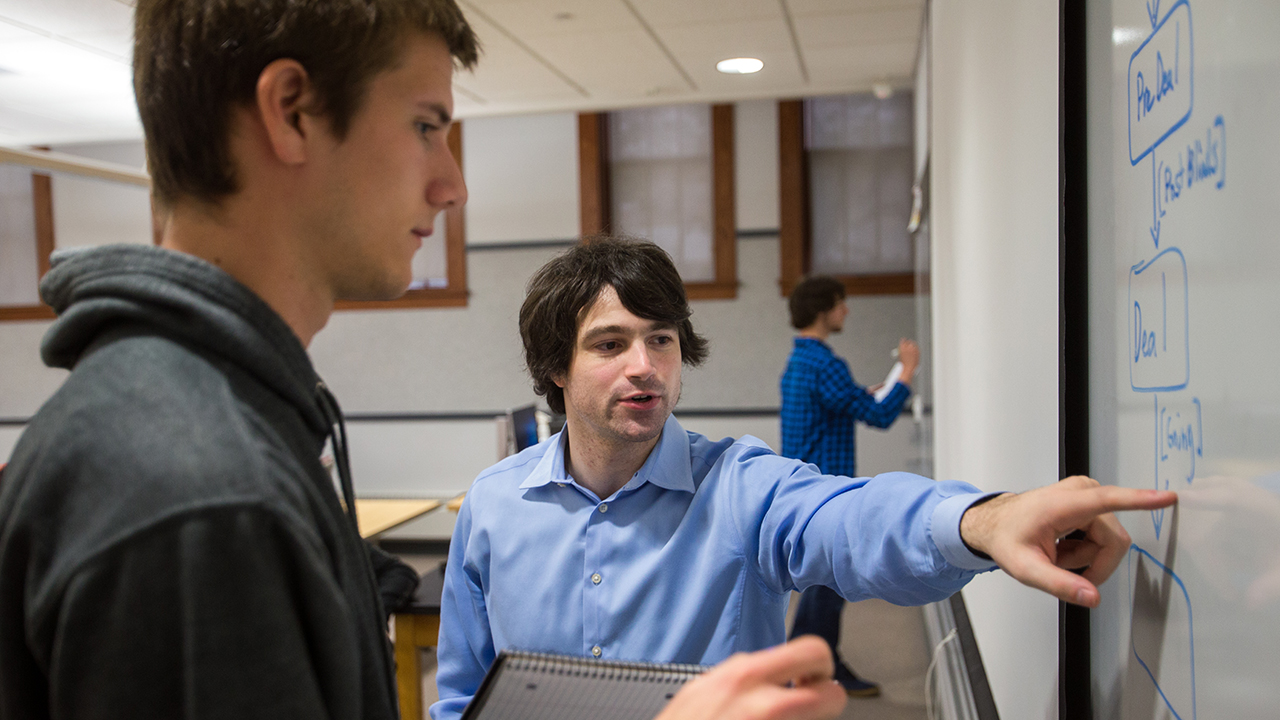
Dr. Douglas Selent, assistant professor of computer science and software engineering, joined the University of Wisconsin-Platteville in 2018. He also serves as the software engineering program coordinator. His interests include bringing active learning into his classroom through different activities and gamification.
Throughout his career, Selent has created several applications including a machine-learning algorithm to derive student incorrect processes from the problem inputs and their answer, and an online learning platform called PeerASSIST, which was used by 60 teachers and 600 students. “It benefits students where they are hopefully receiving better content,” he said. “The system was designed to automatically self-improve to be getting better tutoring content to students.”
This summer he is working with a small team of UW-Platteville students, focusing on the topic of counterfactual inference.
Can you explain your research project and why it’s important for UW-Platteville students to have the opportunity to conduct undergraduate research?
Our project is a continuation from last summer’s work. I had a team of four last summer. Last summer we predicted how well we could predict struggling students in our own curriculum from our own past data.
This year we wanted to see how big of an impact changing things could make. For example, if one student is struggling down one course path, how much better could they have done if they were advised on a different sequence of courses? This is an example of counterfactual inference. We are working on various parts of that research. Where could it make a big difference? We only need a small percentage of students. If we could save them a semester, that’s a lot of money for one student. It can make a big difference. If we had advised them differently, could they have graduated sooner? Could their GPA have been better? Could they have saved money?
Last summer, I had a student in the undergraduate scholar program. He originally said to me that he was going to seek employment after graduation. Now he’s considering pursuing a Ph.D. from his experience.
It’s a little bit of the same with this group of students who are possibly interested in graduate school. The summer undergraduate scholar program and summer research gives them a huge advantage. In other fields I think research is more common, but it is less common in software engineering. This program will give our students a big advantage if they choose to continue their education.
Prior to joining UW-Platteville, you taught both undergraduate and graduate courses at Rivier University and Worcester Polytechnic Institute. What qualities have you seen in UW-Platteville students that have impressed you the most?
I love these students. They are extremely honest students. I seem to connect really well with them. They are interested in learning but learning in a fun way.
What inspired you to pursue teaching?
I think it was senior year of undergrad and I didn’t want to work for a company. I thought if I work for a company, I’m going to be just another guy there and the company could replace me with someone else. If I did a really good job or a really bad job, I don’t know if it would make a difference either way.
Whereas here, whatever I do, I know I can make the biggest difference for the most lives being in front of the classroom.
What do you hope students take away from your classes?
Ultimately, I want them to learn the material. That is the biggest takeaway. I want them to learn so they can be successfully employed. Along with that I want them to enjoy my courses. Learn what you need to know, but also enjoy doing it and have some fun while you are doing it.
UW-Platteville is set to return to campus-based learning this fall. What are you looking forward to as you prepare for the upcoming semester?
The UW-Platteville Teaching and Technology Center is doing a lot of great work this summer. They offered a grant to improve course content in an online environment and I applied for it. If you are familiar with Google docs, I’m looking for the programming version of that. Students aren’t collaborating in a Word document, but a programming environment. With the grant I can have small teams of students programming in the same file at the same time. That’s going to be really cool. I’m looking forward to it because I can do a lot of activities. I have some really fun ideas planned with this software tool.